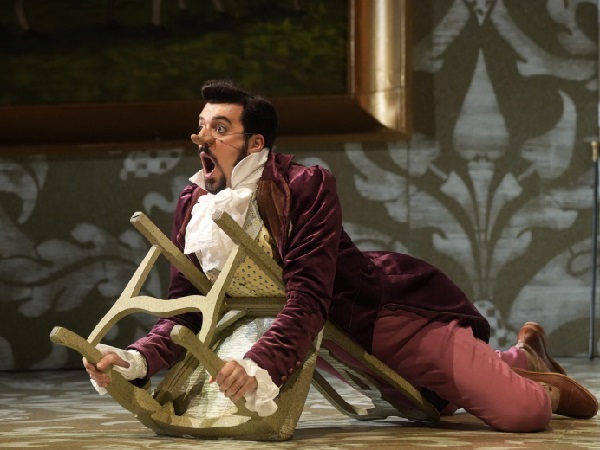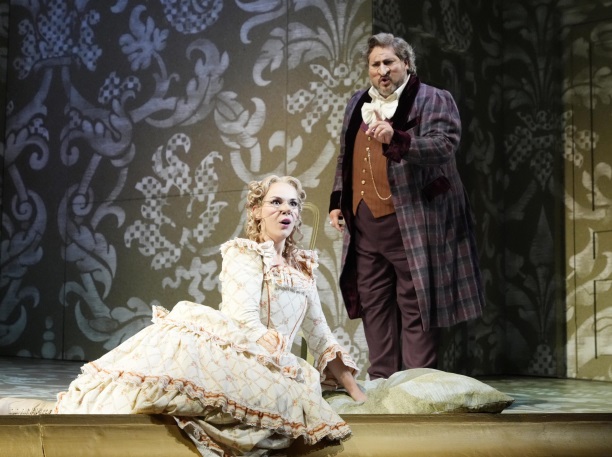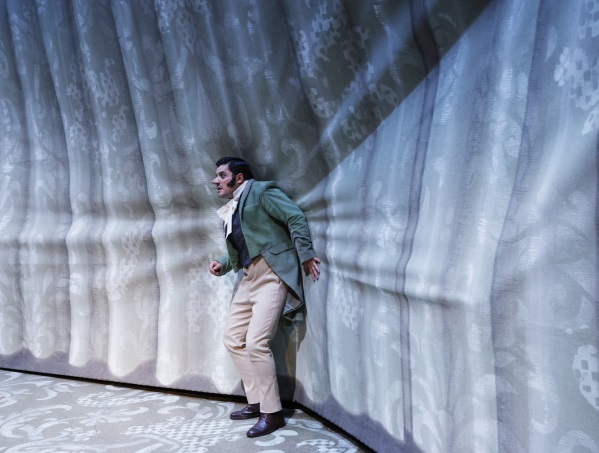Che gran testa! Che parole! Che saper profondo e raro!
L’equivoco stravagante, 16 agosto 2024, Pesaro
Gioacchino Rossini’s opera L’equivoco stravagante was his first full-fledged comic opera and his third opus when the composer was just 19 years old, a student at the Bologna Philharmonic Academy. Premiered on October 26, 1811, at the Teatro del Corso in Bologna, the opera showcased Rossini’s emerging talent. However, despite its engaging music and comic elements, the opera encountered issues almost immediately after its debut.
The plot revolves around misunderstandings and mistaken identities, classic elements in comic opera. However, certain aspects, such as the piquancy of the libretto with its ambiguity and the theme of army desertion, were deemed too provocative for the time. These elements displeased the authorities, leading to the opera’s withdrawal after only three performances.
In Pesaro, we are given a rare opportunity to enjoy this opera, as if Rossini’s hidden gem has been brought to light. It was staged here for the first time over 200 years after its debut, reviving a work that had long been overlooked. This production not only revives Rossini’s historical legacy but also allows modern audiences to appreciate his early creative experiments, which laid the groundwork for his future masterpieces.
The 2019 production of L’equivoco stravagante at the Rossini Festival in Pesaro was particularly noteworthy. The staging featured characters with exaggeratedly long noses, enhancing the grotesque and absurdist humour inherent in the story. These long noses clearly reference the tradition of Commedia dell’Arte, where masks and exaggerated features were central to creating recognizable comic archetypes. This connection to the Italian theatrical tradition added historical context and a visual comic effect, making it easier to recognize the characters‘ roles.
The entire scene is framed like a painting, adding a metaphorical and visual layer to the production. This device creates the impression that the audience is viewing a live painting or theatrical artwork. It enhances the theatricality and artificiality of the performance, emphasizing that the action on stage is a ‘play within a play’. The frame symbolizes the boundary between reality and fiction, creating a detached effect and highlighting the artistic allegory of the performance. This staging also creates the illusion that the audience is shrinking and entering a music box, immersing them in a miniature, artificial world where the characters move and ‚play‘ their roles to Rossini’s music.
The evening opens with a superb overture conducted by Maestro Michele Spotti, brimming with the youthful energy of Rossini. From the very first bars, the music evokes reflections on how it was perceived two centuries ago, when these notes opened new horizons in opera. Today’s performance impresses with its solemn elegance and crystal clarity, reminiscent of the young Mozart. These transparent musical lines and dynamic inventiveness create an atmosphere of intrigue, foreshadowing the drama to come. In a full hall, the music sets a tone of anticipation and promises an unforgettable theatrical experience.
The servants Frontino (Matteo Macchioni) and Rosalia (Patricia Calvache) immediately plunge us into a fervent love scene. Even after two centuries, this scene retains its overt passion and piquancy, demonstrating why Rossini’s opera faced criticism in its time. Following this, other servants with even more elaborate moustaches burst onto the stage, turning the situation into a grotesque comedy with exaggerated movements and manners. The absurdity of their actions, including their nervous scratching, is so infectious that it seems the entire audience might start scratching along with them.
The witty text of the opera, with its sparkling comic skill, deserves special mention. Gaetano Gasbarri’s libretto captivates the audience with its cleverness and keeps them engaged throughout the performance. As a virtuoso of words, Gasbarri’s text complements Rossini’s music perfectly, adding a special spark and layered humour.
Gasbarri’s language is rich with wordplay, deliberate distortions, and subtle sarcasm, enhancing the comic effect and adding depth to the characters. His skillful manipulation of language not only highlights the absurdity of the situations but also makes the characters vivid and engaging. This linguistic humour, sometimes farcical in nature, creates an additional layer of enjoyment, blurring the boundaries between the serious and the comic.
For example, Ernestina, played by Maria Burakova, appears as an educated and well-read girl, a true intellectual. Her erudition and wit shine through in her conversations with Buralicchio, where she effortlessly incorporates philosophical and pseudo-scientific terms. For instance, she describes chairs as ‘bodily structures to assume a curvaceous form upon two suitable receptacles’ or simply as ‘convenience’, confusing others with her complex formulations. These unexpected intellectual turns of phrase not only provoke laughter but also highlight her character—she uses her intelligence to embarrass her interlocutors playfully. Buralicchio is left with no choice but to exclaim, ‘Bella lingua!’
This play on words and the abundance of ‘intellectual’ jokes in Ernestina’s remarks create a vivid contrast to the absurd situations around her, adding a comic layering to her image. Ernestina becomes the embodiment of intellectual farce, and Gasbarri skillfully mocks those who adorn their everyday speech with abstruse and cumbersome terms, often used out of context. He illustrates how such technical or pompous expressions can distance the meaning from common sense, turning communication into a ridiculous parade of empty rhetoric.
In this satire of excessive scholarship, one can also see a reference to the librettos of ‘classical’ operas, where even the most mundane expressions are cloaked in florid and gallant phrases. Gasbarri wittily parodies this style, showing how theatrical characters, with their far-fetched and complex formulations, become even more comical, while the essence of their statements is obscured by pompous rhetoric.
Maria Burakova’s performance infuses Ernestina with vivacity and charisma, emphasizing her intellectual superiority. This makes her not only the focus of comic situations but also an active participant in their creation. Her portrayal transforms Ernestina into the central figure of the plot, weaving verbal play and witty turns into a dynamic and comic narrative.
Burakova’s clear and sonorous voice perfectly complements the role of Ernestina, adding lightness and grace. She balances the musical and dramatic aspects of the role with finesse, creating a character that is both emotionally flexible and subtly engaging. Her vocal prowess enhances the comic elements of the performance, giving each musical number a special expressiveness and charm.
Her virtuoso execution of the upper notes, despite the complex text, and her meticulous attention to each phrase stand out. Overall, Burakova creates an impression of a neat and dreamy figure, akin to a porcelain doll in a music box, enhancing the overall impact of the performance.

© Amati Bacciardi
Vying for young Ernestina’s heart are Buralicchio, a rich and foolish young man, promised in marriage to Ernestina, and Ermanno, an ennobled country worker. Carles Pachon, who plays the flamboyant and comic role of Buralicchio, masterfully conveys all the nuances of his smugness and clumsiness. His Buralicchio is a supposed intellectual, a smug pretender who, despite his wealth, remains a crude and ridiculous suitor. A special number is his aria in Act I of Occhietti miei vezzosi, which abounds in linguistic parodies. There are diminutive and affectionate forms such as occhietti and bellina, and banal love clichés such as eterni Dei, voti miei, as well as cumbersome linguistic outpourings that sound completely unnatural for traditional operatic language: brutta, magnetismo, fanatismo. Pachon deliberately emphasises these verbal puns, giving them a hypertrophied importance. Despite the clumsiness and comicality of his character, Carles Pachon easily juggles phrases in this role. His character’s deep baritone is confident on stage, giving Buralicchio added charisma. Pachon masterfully manages both the musical and dramatic elements, making his character both the object of ridicule and the centrepiece of many comic scenes.

© Amati Bacciardi
Ermanno, in his turn, is the complete antithesis of Buralicchio. This character, unlike his pretentious opponent, embodies modesty and honesty, free from ostentatious scholarship and narcissism. In Pietro Adaíni’s interpretation, Ermanno appears as a reserved but deeply emotional hero. His sincere feelings for Ernestina are emphasised by the softness of his vocal line and his natural behaviour on stage. The simplicity and cordiality of his character create a vivid contrast to the hypertrophied comic traits of Buralicchio, making Ermanno the voice of common sense and sincere love in this whirlwind of absurd situations. His recitative and Ermanno’s aria reveal the deep emotional and dramatic layers of his voice and allow him to gain the listener’s trust and faith in his serious intentions: Sento da mille furie Tutta agitarmi l’anima!

© Amati Bacciardi
Buralicchio quickly abandons his idea of marrying the naive Ernestina when he learns shocking information that turns out to be untrue: Ernestina is actually a castrato hiding in women’s clothing to avoid conscription. We see his self-confidence and deliberate desire to impress instantly dissolve into fear and confusion: “Più lo guardo, più l´osservo, Più l`Eunuco in lui ravviso; Femminin non è quel viso Ha un tantin d`umanità”. As a result, Buralicchio has no choice but to look for a new bride. His desire to quickly forget his recent ‘misunderstanding’ and go in search of a wife again emphasises his frivolous and selfish character. At the same time, Ermanno and Ernestina, having overcome all misunderstandings and obstacles, can finally be together, their sincere feelings finding an echo and a deserved fulfilment. This final twist not only emphasises the triumph of true love over empty ambition, but also leaves the audience with a sense of completion and harmony.
The six characters in this opera are like cards up the sleeve, each bringing their own unique dynamics and developing the opera’s storylines. The ace here is clearly Ermanno, as his sincerity and deep emotions become the centre of the opera, contrasting with the comic excesses of the other characters. The farcical nature of the opera reaches its climax: the frivolous and vain Buralicchio, a parody of many operatic heroes, is defeated by honesty and modesty. The linguistic twines in the lexicon of Gasbarri’s libretto, with its fireworks of courtesan, scientific, folk, colloquial, sometimes even erotic words, neologisms and also invented words, enhance the overall comic tone of the work, which mocks human weaknesses, superficial aspirations and naive ambitions, making L’equivoco stravagante one of the brightest gems of Rossini’s early work.
Darina Leuer

